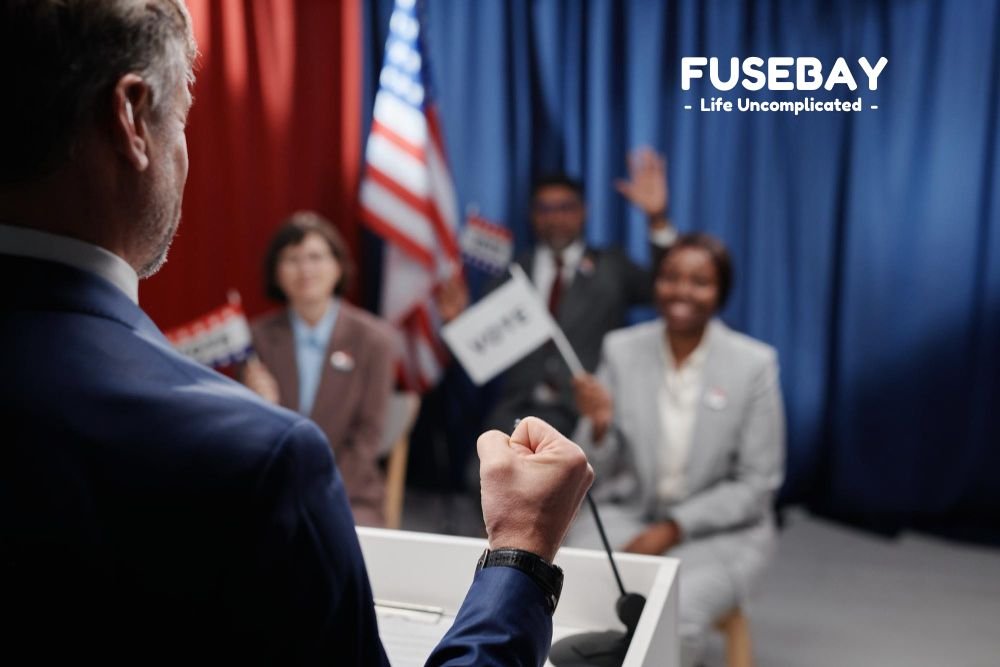7 Reasons Why Donald Trump Won the Presidential Election:
Donald Trump’s victory in the 2024 presidential election signals a remarkable comeback and a further shift in American politics. Building on his previous successes and addressing new national and global challenges, Trump secured a second term by appealing to a broad swath of the electorate and capitalizing on unique factors influencing voters. Below, we analyze 7 reasons why Donald Trump won the presidential election, demonstrating how his campaign adapted to a changing political climate and resonated with diverse voters.
1. Focus on Economic Resilience and Domestic Manufacturing:
Economic issues played a significant role in the 2024 election, with many Americans concerned about inflation, job security, and supply chain vulnerabilities. Trump’s message centered on strengthening the U.S. economy and promoting domestic manufacturing, which resonated strongly with voters.
- Jobs and Wages: Trump highlighted his commitment to increasing American wages, securing jobs, and supporting policies that benefit the middle class. His stance appealed to those who felt financial pressures and sought stability.
- Energy Independence: He emphasized policies aimed at achieving energy independence, particularly advocating for domestic oil and gas production to reduce reliance on foreign energy sources.
- Reviving Manufacturing: Trump’s push to bring back manufacturing to the U.S. resonated with workers in key states who had seen factories close over the years. This message helped him gain support in swing states with strong industrial histories.

2. Strong National Security and Border Control Stance:
Trump’s firm stance on border security and national defense was a cornerstone of his 2024 campaign. With immigration and national security becoming increasingly important to voters, Trump presented a vision focused on safety, sovereignty, and securing the nation’s borders.
- Immigration Policies: Trump’s continued advocacy for strict immigration policies appealed to voters concerned about national security, job competition, and social services. His promise to enhance border control struck a chord with voters in states impacted by immigration issues.
- Addressing Drug Trafficking: With rising concerns over drug trafficking and the fentanyl crisis, Trump focused on policies aimed at cracking down on cartels and strengthening border protections to address the issue.
- National Defense and Foreign Policy: Trump also emphasized the need for a strong U.S. military and a decisive foreign policy, which resonated with voters who prioritized a robust defense posture and increased vigilance against global threats.

3. Leveraging Media and Digital Platforms Effectively:
Trump’s experience with media and social platforms once again became a strategic asset. His ability to communicate directly with his audience without the need for traditional media was central to his campaign.
- Direct Communication with Voters: Trump’s digital strategy allowed him to engage voters directly on platforms like Truth Social and X (formerly Twitter). This direct line to his supporters bypassed traditional media, which helped him shape his narrative and address issues important to his base.
- Counteracting Negative Coverage: Trump used social media to address controversies and negative media coverage quickly, keeping his supporters informed and rallying them to his defense. This approach allowed him to stay top of mind among voters who felt traditional media coverage was unfair.
- Mobilizing Grassroots Support: Trump’s digital strategy allowed him to mobilize grassroots support through targeted ads, online rallies, and direct messaging, helping him maintain a dedicated base of support across the country.

4. A Platform Focused on “Law and Order” and Reducing Crime:
Concerns over crime and safety continued to shape the political landscape in 2024. Trump’s campaign focused heavily on law and order, emphasizing his commitment to reducing crime rates and enhancing public safety.
- Support for Law Enforcement: Trump’s strong support for law enforcement agencies and his promise to tackle rising crime rates were central themes of his campaign. This message appealed to voters in both urban and suburban areas who wanted a greater focus on safety.
- Policy on Criminal Justice Reform: Trump presented a plan to improve criminal justice, including initiatives to combat violent crime and address concerns over drug-related offenses, particularly in regions most impacted by these issues.
- Protecting American Communities: Trump’s message of “law and order” resonated with voters seeking safety and stability, particularly in cities that experienced increased crime rates over recent years.

5. Targeted Appeals to Swing States and Rural Voters:
Trump’s campaign strategy for 2024 involved a calculated focus on swing states and rural regions, where many voters supported his policies on the economy, immigration, and national security.
- Focus on the Rust Belt and Midwest: Trump once again focused on states like Pennsylvania, Michigan, and Wisconsin, emphasizing manufacturing and job creation. This regional focus helped him gain an edge in areas where economic concerns remain prominent.
- Appeal to Rural Voters: Trump’s campaign recognized the importance of rural America, addressing issues specific to agricultural communities and emphasizing his commitment to defending their way of life. His efforts to support American farmers and promote local industries were well-received.
- Building on Regional Concerns: Trump’s campaign tailored messages to address local concerns in each state, including healthcare, energy, and agricultural policy, allowing him to build strong regional support.

6. Branding as a Political Outsider and Fighter for the People:
Trump’s brand as a political outsider and a “fighter” for the average American remained influential in 2024. His appeal to those disenchanted with traditional politics strengthened his position, allowing him to rally support across political lines.
- Anti-Establishment Appeal: Many Americans viewed Trump as a fighter against the political establishment, a sentiment that has only grown stronger among disillusioned voters. This outsider image allowed him to position himself as a champion of ordinary Americans.
- Defending American Values: Trump’s focus on traditional values, freedom, and independence appealed to voters who felt these principles were under threat. His platform resonated with those who saw him as defending American culture and identity.
- Appeal to Independents and Populist Base: Trump’s populist message helped him attract a significant portion of independent voters, as well as Democrats dissatisfied with their party’s direction, allowing him to expand his base.

7. The Opposition’s Challenges and Internal Divisions:
Lastly, challenges within the Democratic Party and the opposition campaign worked in Trump’s favor. Divisions within the Democratic Party and public discontent with their platform allowed Trump to draw in voters seeking a change in direction.
- Party Divisions and Voter Frustration: The Democratic Party’s internal disagreements and competing priorities hindered its ability to present a united front, which played to Trump’s advantage. He was able to capitalize on this division, appealing to voters who felt the opposition wasn’t addressing their key concerns.
- Perceived Disconnect from Voter Concerns: Trump’s opponent was perceived by some as out of touch with voter priorities, particularly regarding economic and security issues. This perception enabled Trump to position himself as more responsive to the needs of everyday Americans.
- Mobilizing Swing Voters: Trump’s campaign targeted swing voters dissatisfied with the Democratic Party’s platform, especially those concerned with the economy, immigration, and national security. This approach helped him build a coalition that extended beyond his traditional base.

Conclusion:
In summary, exploring the 7 reasons why Donald Trump won the presidential election reveals how his campaign strategy resonated with diverse voter concerns. Donald Trump’s victory in the 2024 election illustrates how a combination of economic, security, and cultural issues can significantly influence voter sentiment. His focus on revitalizing the economy, securing national borders, supporting law enforcement, and presenting himself as an outsider champion resonated with a broad array of voters. Trump’s win highlights the importance of addressing the evolving needs of American voters and demonstrates the impact that a well-strategized, direct campaign can have in modern U.S. politics. As Trump re-enters the White House, his victory will be studied as a testament to how adaptability, message discipline, and an understanding of voter priorities can lead to electoral success.
Discover amazing information and unique finds on FuseBay! Don’t miss out—must visit our website for exclusive articles and top-notch blogs tailored just for you!



